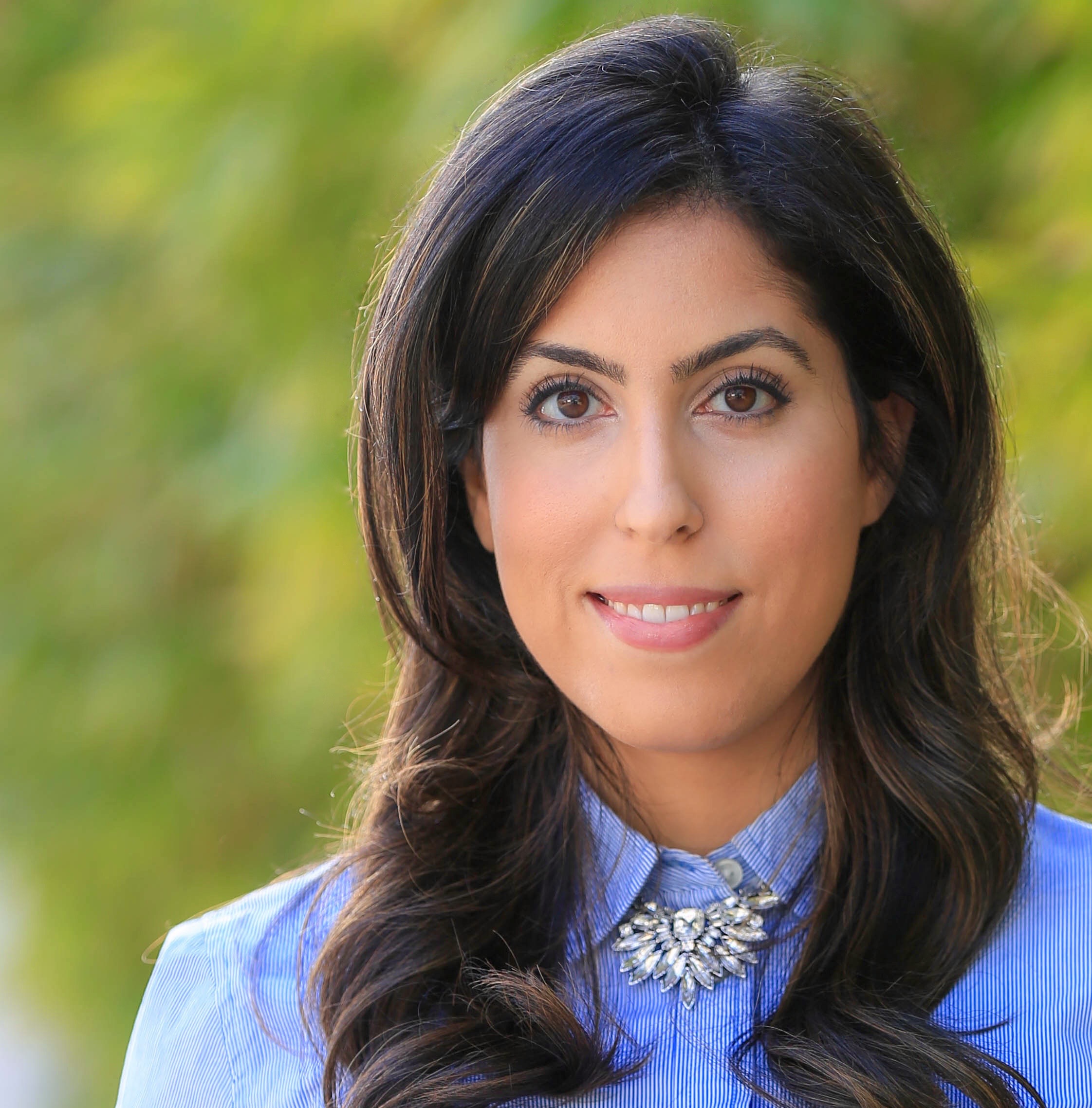Movement Living: As a licensed clinical psychologist, what led you to focus your practice on sleep health?
Dr. Nicole Moshfegh: I was trained generally in mental health first. I worked with a lot of anxiety, depression, trauma. But one theme I noticed throughout my training was that a lot of people also had sleep issues in addition to various mental health disorders—and that just wasn’t something that most graduate school training programs spent a lot of time on. I became pretty fascinated with that. Why are we not looking at this more? I learned about CBTI (cognitive behavioral therapy) for insomnia, and noticed that it was helping my patients so much. That’s when I decided, ‘This can help people in so many ways—this is going to be the area that I’m going to focus on.’
Movement Living: There’s such a need for what you do, and sleep issues are something that most people write off as impossible to improve, and live with them for years. How important is it for women to prioritize their sleep for overall health, physically, mentally, emotionally.
Dr. Nicole Moshfegh: There are a lot of reasons, especially for women, and women in midlife. Sleep really impacts every part of our body–our immune functioning, our cardiovascular health. It can affect hormones, which, in particular for women as they get older, can really throw things off for cell repair and recovery. And then of course, there are things like our mood, our emotional regulation, our cognitive functioning. Anything you can think of can be impacted by our sleep. Everything tends to work together in our bodies.
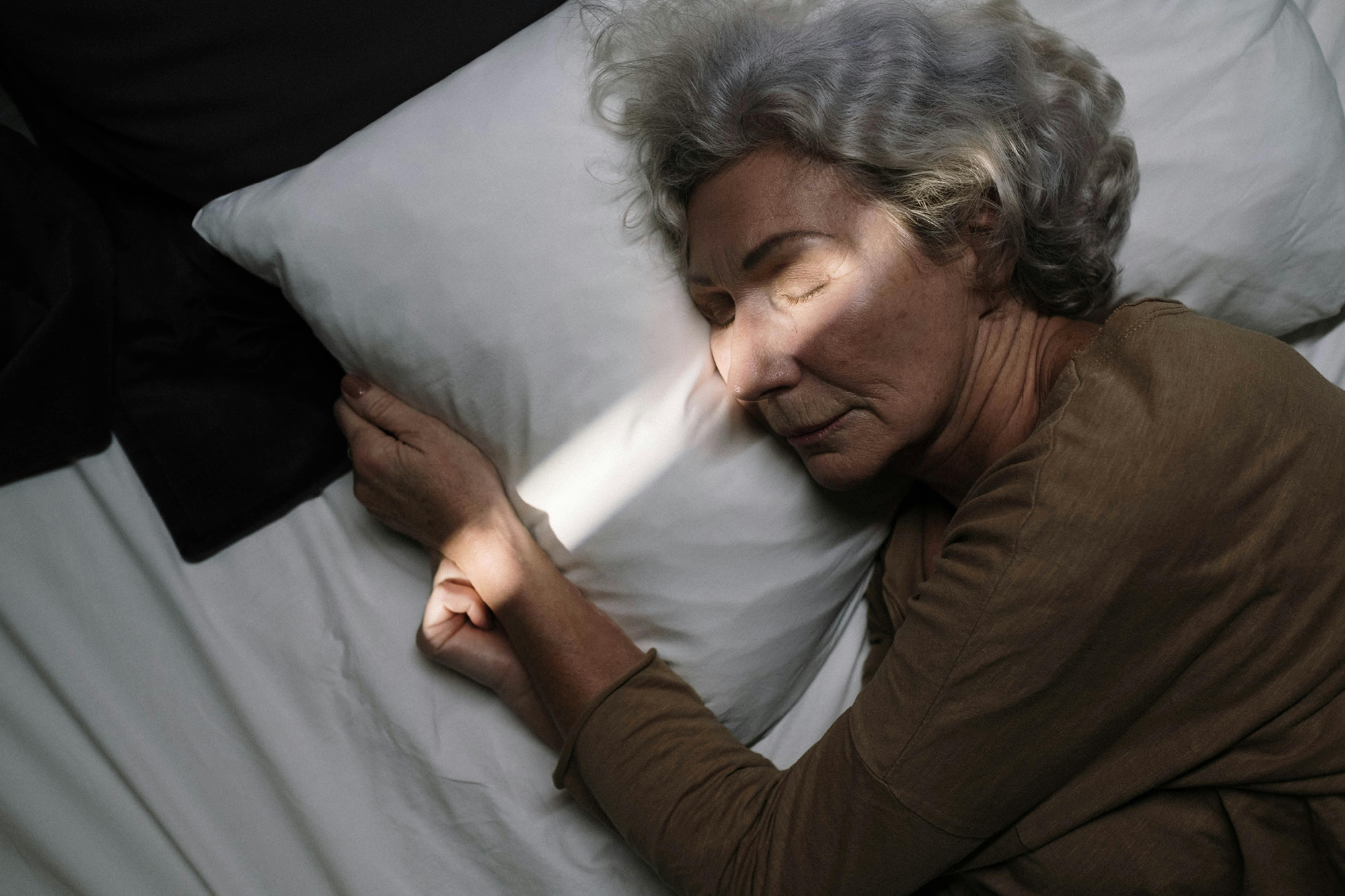
Movement Living: Specifically thinking about women in midlife, how does menopause (and the years beyond) change sleep quality so much?
Dr. Nicole Moshfegh: For women who are approaching menopause, actually in menopause, or even postmenopause, there are hormonal changes that happen most specifically with progesterone and estrogen. The levels drop over time, and those hormones can affect our sleep quality and architecture—the different types of the sleep stages that we enter into. Sometimes women will even be at higher risk of insomnia, develop things like sleep apnea, or even restless leg syndrome. These hormonal shifts can also cause symptoms like night sweats or hot flashes. And then women in midlife, you know, they also are more prone to developing other types of mental health disorders like depression and anxiety that can impact their sleep. There are lots of tools and strategies, though, that you can use to help manage those symptoms. You’re not doomed. You shouldn’t just suffer through it.
And then in general, as we age, things change within our brain. Neurotransmitters change, and that affects hormones. It’s not that older people need less sleep—it’s just that you’re unfortunately less capable of producing as much sleep or good quality sleep.
In addition to the biological changes that can happen within our body, the older you get, the higher your chances are of developing different medical illnesses, disorders, or chronic pain conditions; and the medications you might be on to manage them can impact sleep. Also, the older you get, the less you might be moving your body. All these things can add up and impact your sleep.
But again, you’re not doomed. There are things that you can do to help yourself if you’re in that category (and there are some people that their sleep doesn’t get affected at all!) So it really depends on the person.
Movement Living: Your Book of Sleep has 75 tips for sleeping better. Are there a few specific ones that come to mind for women in this stage of life?
Dr. Nicole Moshfegh: Yeah, so it’s so hard for me to narrow it down. I typically like to individualize plans for people, because the reasons why people are experiencing sleep issues vary from person to person. But if I were to give a blanket suggestion, narrowing it down as much as possible, for what women in midlife could do, I would first want to focus on your sleep hygiene. Number one, especially if you’re experiencing night sweats or hot flashes. Do you keep your room cool? Are you keeping the temperature on the cooler side? Are there any kind of cooling materials that you could use for bedding or pajamas. There are self cooling mattresses or duvets and things like that that you could use.
And then there are other general sleep hygiene tips that most people know of–but not everyone is good at maintaining them. Making sure you’re getting movement throughout the day, as much as it can allow without injuring yourself. Getting some amount of sunlight in the morning—that one’s going to depend on your Circadian rhythm. If you’re on the older end of the spectrum, your Circadian rhythm also shifts and you might go to bed earlier and wake up earlier. In that case, the morning light is maybe not what we want to seek, but for other people who have a typical Circadian schedule, then some early morning sunlight would be good.
Beyond these basic general sleep hygiene rules, I would also say to find some sort of daily relaxation activity that you can engage in to manage distress when something comes up—just to manage overall levels of anxiety, particularly during that period of your life. There’s so much changing, not just in your body, but overall! Maybe you’re empty nesting, or relationship challenges come up. Maybe you’re close to retirement or post retirement. There’s so many changes for all of us that can happen, so being able to identify at least one relaxation tool that you can go to on a daily basis (whether it’s deep breathing, meditation, progressive muscle relaxation, or yoga) is important. Something that you can stick to to keep your brain and body in balance.
The last thing I could think of that would be really important—if you’re having chronic issues (meaning you’re having trouble sleeping at least 3 nights a week or more, and it’s been happening for at least a few months), then don’t ignore it! Don’t suffer through it. Reach out to a professional, because there are so many people that can help you and give you evidence-based tools.
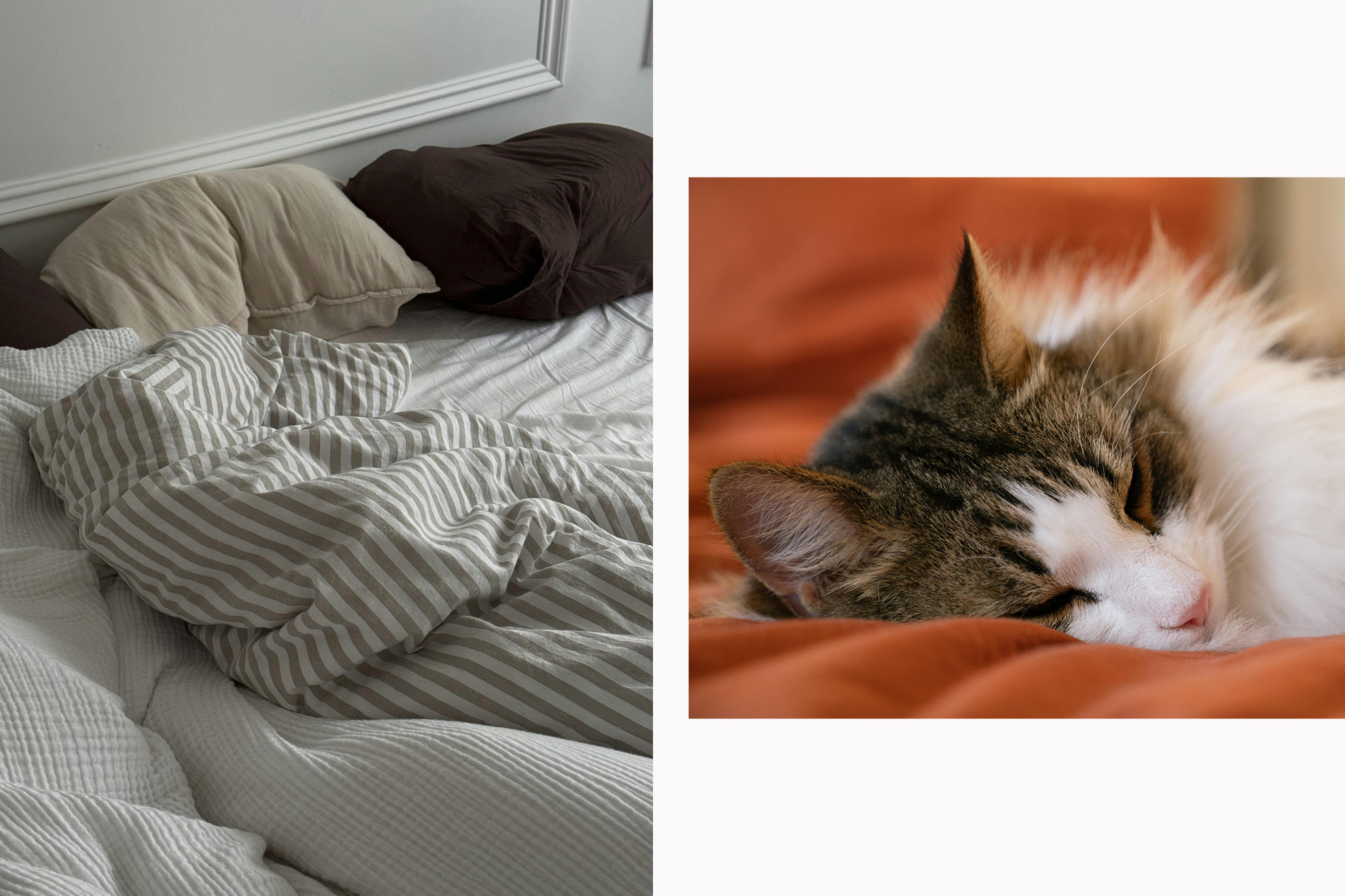
Movement Living: As far as meditation or relaxation techniques, is there an ideal time to do that—during the day or before bed?
Dr. Nicole Moshfegh: Any time of the day where you can do it consistently would be good! Whether it’s morning, afternoon, or evening, whenever you can get it in at a consistent time and it becomes a habit would be most ideal. The only time that I would try to veer away from this is for people who are consistently having trouble sleeping. Maybe they have insomnia, then we don’t want to use the consistency as something that becomes stressful. ‘I have to do this, otherwise I’m not going to be able to sleep!’ Keep it in balance. It’s not a pill you’re taking in order to produce sleep. That’s not the point. The point is to bring your general levels of anxiety and stress down.
Movement Living: That’s very helpful. And for people that have trouble waking up in the middle of night—falling asleep fine, but waking up and not being able to fall back asleep—do you have any practical tips to combat that?
Dr. Nicole Moshfegh: Since it depends on the person, I would say number one to figure out what is happening for you. Are you waking up because you have to use the bathroom? If that’s happening once or twice a week, it’s normal. If it’s happening more than that, then you’re probably drinking too many liquids too late in the evening. Could it be that you’re having a lot of thoughts come up in your mind, thinking about your to-do list, or worrying about something that happened? Could it be that you took a nap really late in the day? Take a look at some of the reasons and track it over time to see what could be contributing. If there’s something practical you could do like stopping drinking liquid at a certain time, or limiting naps or dozing off, try that. But maybe if you notice that you’re worrying about something in particular, perhaps you would want to give yourself some opportunity earlier in the day to work through some of that. Spend 10 or 15 minutes (not close to bedtime, at least 3 or 4 hours before) writing out your to do list or anything that you’re worried about. Try to problem solve to reduce the chances of it coming up in the middle of the night. If that’s not helpful, you can also try to keep a notebook on your nightstand, and if you notice the thoughts coming up, write it down so you’re not carrying it all in your mind.
Another big thing is that you don’t want to try to spend too much time in bed if you’re awake. The longer you’re in bed and you’re awake and anxious or worried, the more your bed gets paired or associated with not sleeping. Then that contributes to longer term problems. The best thing to do if you notice you’re waking up in the middle of the night is to get out of bed if you can. Do something low key, relaxing. A lot of people worry, ‘Is the light going to wake me up?’ You’re already awake. It’s not going to wake you up more. Just do something to get your mind off the fact that you’re not sleeping. Once you feel sleepy again, then you can return to bed and overall. You can’t force yourself to fall back asleep; you will fall back asleep once you feel ready. Just allow yourself to trust in that process and remind yourself, ‘Okay, maybe I’m not asleep now, but I’m going to catch the next wave when it comes, and then when I feel sleepy, then I can return to bed.’ And again, if it’s a chronic issue, talk to someone about it. Don’t ignore it.
Movement Living: Okay, wow! That’s super helpful. Because I definitely would have thought, ‘Well, I need to stay in bed, keep my body relaxed, stay in the perfect conditions to fall asleep.’ But then you’re waiting for something that isn’t going to happen at the moment!
Dr. Nicole Moshfegh: Yes, and some of it depends how long you’ve been up. Maybe you want you want to give yourself some time, say 15 or 20 minutes. Try to take some deep breaths, whatever it is to calm yourself down. Maybe you’ll fall back asleep naturally, but if you don’t, then you want to get out of bed. If you’re noticing you’re having a lot of thoughts and it’s hard to get out of at thought loop, try some distraction strategies. Some people find it useful to use a mundane word, like the word ‘the’, and repeat it to yourself mentally. Try it with different frequencies and different loudness or softness levels, just to distract yourself from the thought. It’s similar to counting sheep or doing some mental arithmetic again to get your mind off of the fact that you’re not sleeping. It also may help to remind yourself that you may not be sleeping, but at least your body is resting. You don’t want to add more pressure—that’s the biggest thing.
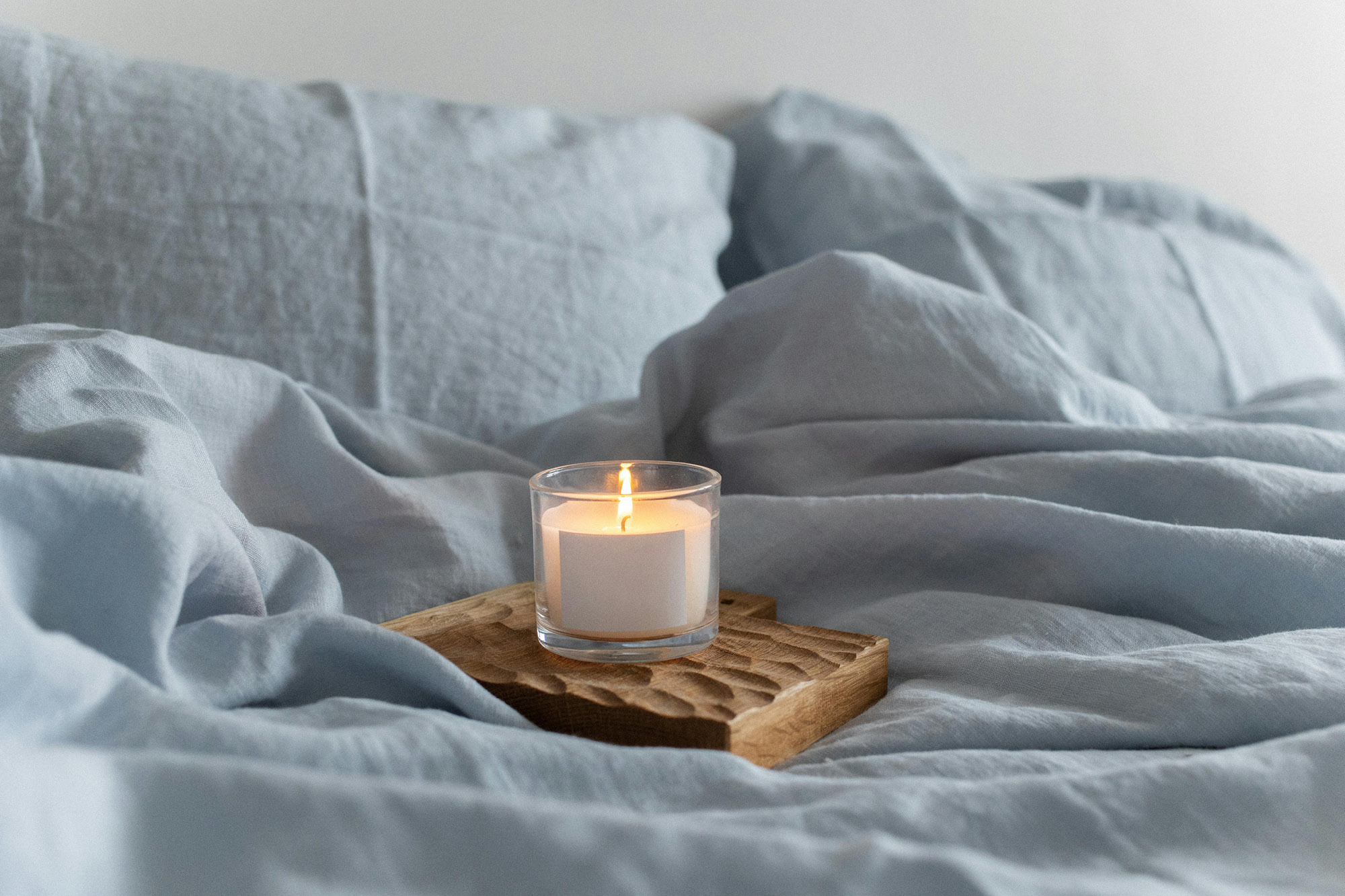
Movement Living: Yes, there’s nothing worse than being anxious about being anxious, feeling stressed about feeling stressed! Are there any other resources like Nothing Much Happens or body scans that you would recommend?
Dr. Nicole Moshfegh: Yes, absolutely. Again, it’s best to not do these in bed, because you don’t want to build up that habit of doing things unrelated to sleep there. Sex can be the exception to that in bed, of course. You could listen to an audio book. You could listen to a sleep story. You could do a relaxation exercise, progressive muscle relaxation, mindful meditation, deep breathing, guided imagery. Those are all things that you could do to relax. Like I was saying, you can’t force yourself to sleep—there’s nothing that you can do that will automatically work. It’s more about getting your mind in a different place; accepting the fact that you’re not sleeping right now. It’s not ideal, but it’s not the end of the world. That can take the pressure off, and then you can do whatever it is that you find works best for you. Even watching a show on TV—that’s totally fine. As long as you’re not holding the screen right up to your face. You can watch an episode of something light, like a sitcom, not like a murder show, not the news. And then you will find you’ll start to nod off again, and then you can get quickly back into bed and hopefully be fine the rest of the night.
Movement Living: For these deregulating techniques at the end of the day, would you do all of them outside of your bed? For example, if you’re an evening reader, and that helps you relax, is it better to do that outside of your bed?
Dr. Nicole Moshfegh: If you’re not having sleep problems and you’re not worried about it, then that’s fine—go ahead and read in bed! But if you’re having some sleep issues consistently and it’s been a while, try to limit your bed and bedroom for sleep and sex only. Don’t do anything else there—go somewhere else in your home to do your unwinding, and then once you feel sleepy, you can get into bed.
Movement Living: The screens topic is interesting. Are there any rules or routines around that or that, or not?
Dr. Nicole Moshfegh: The reason why a lot of people, especially in recent years, have become nervous about screens is because of how it impacts melatonin production in our brain (melatonin is the sleepy hormone). It’s what controls the timing of our sleep, tells you when it’s time for bed, or time to be alert. It works primarily off of sunlight, although other things can affect it as well. But every morning when we get up and we start our day, we get some sunlight. It resets the circadian rhythm of our brain. It’s time for a new day. But if we’re getting too much light exposure, especially sunlight or a similar spectrum (that blue light which we get from our devices and our screens), it can trick our brain into thinking it’s still daytime. So, it suppresses melatonin production in our brain and our body, and then delays our sleep onset. That’s why a lot of people get nervous about screens. And yes, in general, we want to try to avoid really bright screens at least like an hour or 2 before bed. Again, it depends on the person. For someone who has delayed onset–maybe they’re not falling asleep until 2-3 am, their circadian rhythm is a lot more like a night owl or an evening type. Then they really would want to pay attention to how much light they’re getting in the evening, even 3 hours before limiting how much light you’re exposed to. For other people who are early birds–and typically as we get older, our Circadian rhythm shifts and we start getting up earlier and going to bed earlier—it doesn’t affect them as much. It’s not that it won’t affect them at all, but they’re probably going to want to get more light in the early evening, so that they’re not going to bed super early. It really depends on the person.
But, screens are not the end of the world. If you’re watching a little bit of something an hour before bed, and if it relaxes you, and if you’re not having sleep issues, don’t worry about it. Don’t create a problem where there is none! Of course, if you’re watching really emotionally-laden content and you wake up thinking about it or it delays your sleep onset, then you might want to shift things. But there’s no blanket, hard-and-fast, ‘You must do this, and that’s the only way you’re gonna sleep’ rule.
Movement Living: We really appreciate that—don’t make a problem where there isn’t a problem. We can read so many pieces of advice and try to implement it all, even though we don’t need to.
Dr. Nicole Moshfegh: Yes—the best thing is anxiety management.
Movement Living: How much sleep, in general, should women be getting as adults?
Dr. Nicole Moshfegh: It varies from person to person, but the typical range is 6 to 9 hours. That’s my wide range, but some people need a lot less and some people need a lot more. The best way to kind of figure that out for yourself is to subjectively keep track of your sleep, using what we call a sleep diary for a week or 2. Write down basic notes about what time you fell asleep, what time you woke up, and then tally up. Maybe you averaged about 7 hours, and you felt great during the day, and ou had all the energy you needed—then 7 hours is probably your number. You don’t need to think too much about it. If you notice you were dragging on certain days, or it was hard to do certain tasks, then you could use a little bit more. It depends on the person, but 7.5, plus or minus one, is generally where most people will sit.
Movement Living: Is there an ideal time to stop any caffeine intake during the day, or any science about that.
Dr. Nicole Moshfegh: As with everything, it depends on the person! Some people will metabolize caffeine faster than other people. Women, especially as we age, can become more sensitive to it. It’s important to track whether there have been changes over time, as it could potentially contribute to more menopause symptoms for you. Take a look at that within your own body and see how sensitive you are. If you’re pretty sensitive, then maybe you want to stop no later than noon. It depends on what time you’re trying to get to bed as well; if you’re trying to get to bed earlier, you want to stop earlier. Try move your caffeine intake to late morning, perhaps, and experiment with that to see if that carries you a little bit further. Generally no more than one cup is the best. If you really need a second cup, try it with lunch, and not past one. That’s my blanket statement around caffeine use.
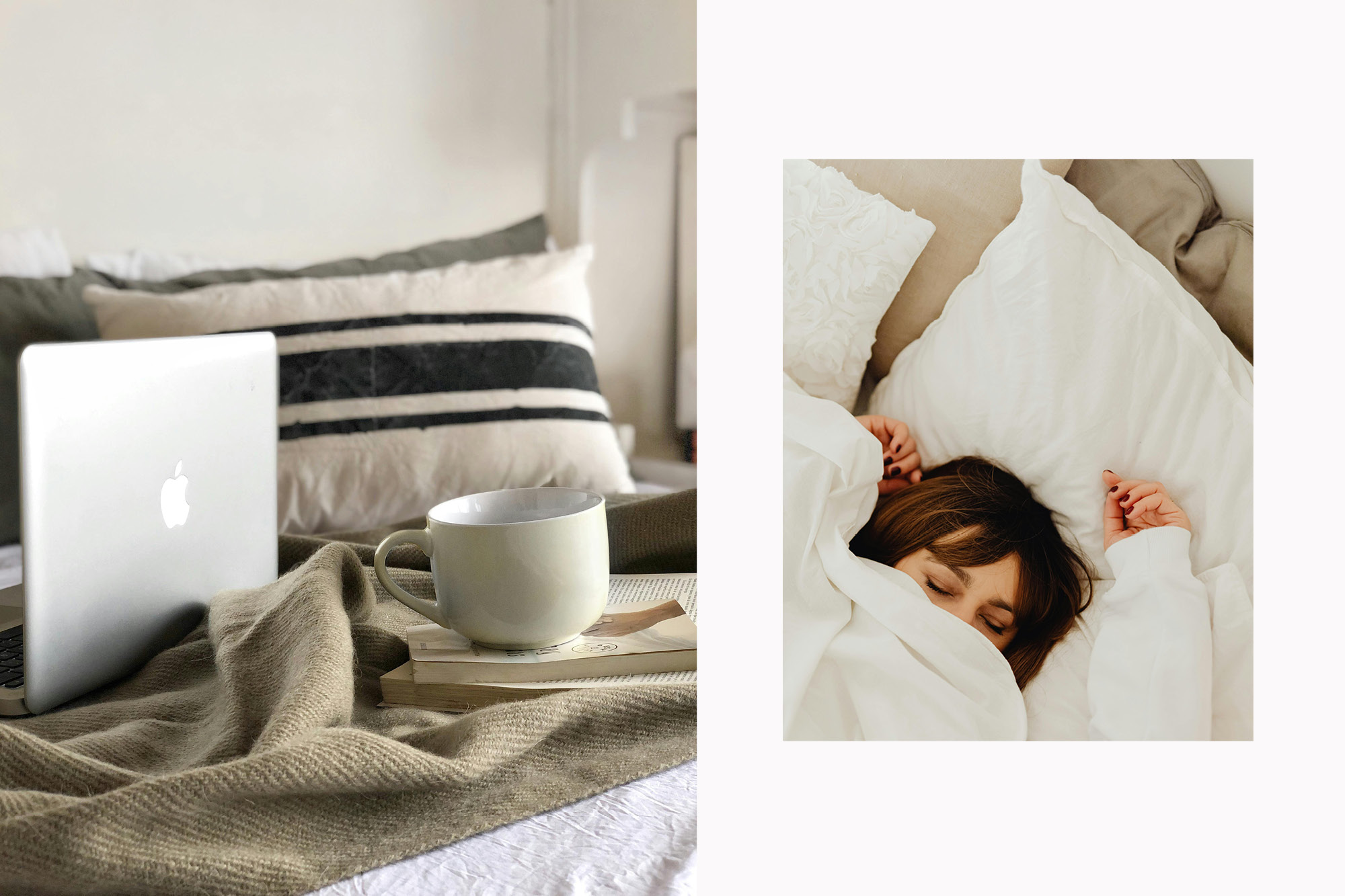
Movement Living: How long is the standard time to metabolize caffeine?
Dr. Nicole Moshfegh: It’s about 8 hours for the half life. So if you’re drinking caffeine during the day, that means for most people it’s still in your system when you’re trying to sleep. And again, you don’t need to be so rigid where you’re telling yourself, ‘I can never have caffeine again’. But monitor how it’s affecting you. Experiment with cutting back or stopping a little bit earlier, and see if that helps you feel a little bit better. And then maybe that’s what you continue to do if it works.
Movement Living: And what about alcohol? Do you have any specific advice for someone likes to have a glass of wine at dinner? What are the known effects that are specifically detrimental to sleep.
Dr. Nicole Moshfegh: Alcohol is a depressant, so it will in general help you to fall asleep faster. But, it affects your sleep architecture and quality, and reduces your deep sleep. You’re not going to feel as refreshed and restored during the day. Your body is not going to regenerate as well. It’s really not great for sleep. We want to try to limit alcohol as much as possible, especially if you’re having sleep problems, and especially as a woman in midlife in menopause or postmenopause. If you’re already experiencing some issues, it’s probably not the best idea. I’m not saying you can never drink again, but you maybe look at how much you’re consuming, and how often. If you can push it so that it’s not super close to bedtime, maybe like 3 or 4 hours before, that could give you enough of a buffer so that it’s not impacting your sleep as much.
Movement Living: We talked about Melatonin briefly, and how it works. But what are your thoughts on melatonin supplementation?
Dr. Nicole Moshfegh: We talked about how our body naturally produces melatonin. It’s the sleepy hormone. Some people will take melatonin supplements, but a lot of people take it for the wrong reasons. Melatonin is actually mostly used for jet lag or shift work. Basically, it works on your circadian rhythm to determine the timing of your sleep. If you take Melatonin at the right time, it will push your window earlier and might help you to fall asleep sooner. If people are experiencing jet lag, doing shift work, or experiencing a Circadian rhythm disorder, their sleep onset may be too delayed and they’re not able to feel sleep until 2-3 am. In those cases, you can take small doses of melatonin at the correct time. That can help push your circadian rhythm earlier. Of course, you always want to consult with your doctor about that before you’re taking anything.
It’s not really meant to be used for people who are experiencing insomnia. There’s a difference between people who are having circadian rhythm issues and people who have insomnia. Sometimes people have both, but you really want to take a look at the problem. Are you a night owl that has to keep an early bird schedule? Are you someone who, if left to your own devices, would sleep from 2 am to noon, but then you would sleep fine? If you’re able to keep that schedule, then that probably means you have more of a Circadian rhythm issue going on. But if you’re someone who kept that schedule and you still couldn’t fall asleep, then there’s probably something else going on. For insomnia, melatonin supplementation is really not going to help you solve that issue. The other piece around it is the supplements themselves. They’re not FDA regulated, unfortunately. We don’t know how much is in them, or if there’s anything else in them. You want to be careful with what you’re consuming! And I’ve seen so many big doses of melatonin—way too much. We start typically with half a milligram when we’re trying to treat some of these disorders. If you’re taking it, try maybe 2 to 3 hours before bedtime and see how that affects you, then you can add from there by half a milligram. But again, do that under your doctor’s supervision, because you want to make sure it’s not interfering with anything else you might be taking or any other health issues you have.
Movement Living: That’s very helpful, because manny people think it will help the quality of their sleep, but it actually just regulates when and what your natural rhythms are. What about magnesium as a sleep aide?
Dr. Nicole Moshfegh: There isn’t a lot of good research yet that shows that magnesium is automatically going to help you sleep better. There’s a lot of anecdotal evidence that it can help with certain things, and some people swear by it. And that’s fine, as long as you’re not taking over the maximum amount that you should be taking in a day. Again, you want to consult with your doctor about that. If you think it helps you, it’s not a big deal—but if you’re not having sleep issues, then there’s no need to take it to try optimize your sleep even more. We get magnesium naturally from many of the foods we eat. Why not take a look at your diet first, and see if you can get more that way naturally, rather than going for a supplement. It really depends on what you’re looking for, like. If there’s a sleep disorder, then we want to look at the CBT for insomnia first, before we go to any supplementation. Let’s go to the evidence-based strategies before we jump to that. It might add a little bit to your better sleep, but it’s not going to be a magic pill.
Movement Living: Any general advice for grinding your teeth at night?
Dr. Nicole Moshfegh: A dentist would be better suited at specifically going into this, but you would want to try to figure out why that’s happening for you. Make sure there isn’t something else going on. Many older women are more prone to developing sleep apnea, and some people find that after an apnea episode where they wake up and are gasping for air, they might start grinding your teeth. You want to address the sleep apnea if it’s there, because that could be very dangerous. For techniques around teeth clenching, there are techniques like jaw relaxation and general relaxation strategies that I was talking about before can sometimes be helpful. A lot of people find that anxiety, tension, and things like that can contribute to it.
Movement Living: So if someone knows that they’re prone to it, or they consistently feel tension in their throat and jaw when they wake up in the morning, that’s something they should bring to the dentist or primary care provider.
Dr. Nicole Moshfegh: Yes, absolutely.
Movement Living: About sleep apnea—can you tell us what that is and what to look for?
Dr. Nicole Moshfegh: If you have somebody else around in your household and they hear you snoring super loudly, that’s a pretty good indicator that there might be something apnea-related going on for you. Or, if you notice yourself waking up and you’re gasping for air or it sounds like you stop breathing, your airway is being obstructed. Those would be the biggest warning signs again as you get older. The chances of you experiencing sleep apnea also increase with weight gain. You’re literally not breathing for moments at a time, and that can have a lot of really negative impacts for your health in the long run. That’s why we really want to treat it.
Movement Living: Any other big sleep myths you hear often that you’d want to share about?
Dr. Nicole Moshfegh: I mean, the biggest sleep myth is just around sleep quantity. So people think it needs to be 8 hours, or whatever it is. Sleep needs vary from person to person, but remember that quality is more important than quantity. Sometimes you could be getting 8-9 hours a night, but you’re still waking up not feeling refreshed. It’s not just all about quantity. Some people are lucky, and 5 or 6 h is all they need. Most people need a little more than that. But if you’re the lucky one, embrace it.
A few more tips; avoid napping and dozing during the day if you’re having trouble; get some sunlight exposure in the morning; look at how much time you’re spending in bed. If somebody is having difficulty with their sleep quality and they’re spending too much time in bed, that’s preventing them from building up enough sleep drive. Maybe you’re spending 10 hours in bed hoping to produce 8-9 hours of sleep but you’re only getting 6 or 7. That’s too much time spent in bed. We want to try to shift that, but it can be kind of counterintuitive. A lot of people think ‘I couldn’t sleep last night, so I’m going to go to bed early, or I’m going to let myself sleep in.’ But those things actually perpetuate the problem. We want to take a look at those behaviors and tighten the schedule up to help improve things.
The last thing is just don’t suffer through it. If you’re having consistent problems, reach out to someone. There are many people that can help you.
Dr. Nicole Moshfegh is a licensed clinical and health service psychologist and the author of The Book of Sleep: 75 Strategies to Relieve Insomnia. As the Founder and Director of We Rise Psychology in California, she specializes in helping individuals navigate sleep challenges, anxiety, stress, and burnout. Dr. Moshfegh completed her clinical training at UCLA, where she also taught and mentored medical and psychology graduate students. Passionate about mental health advocacy, she actively engages with the media, sharing her expertise on news outlets, podcasts, and magazines to raise awareness and promote well-being.


